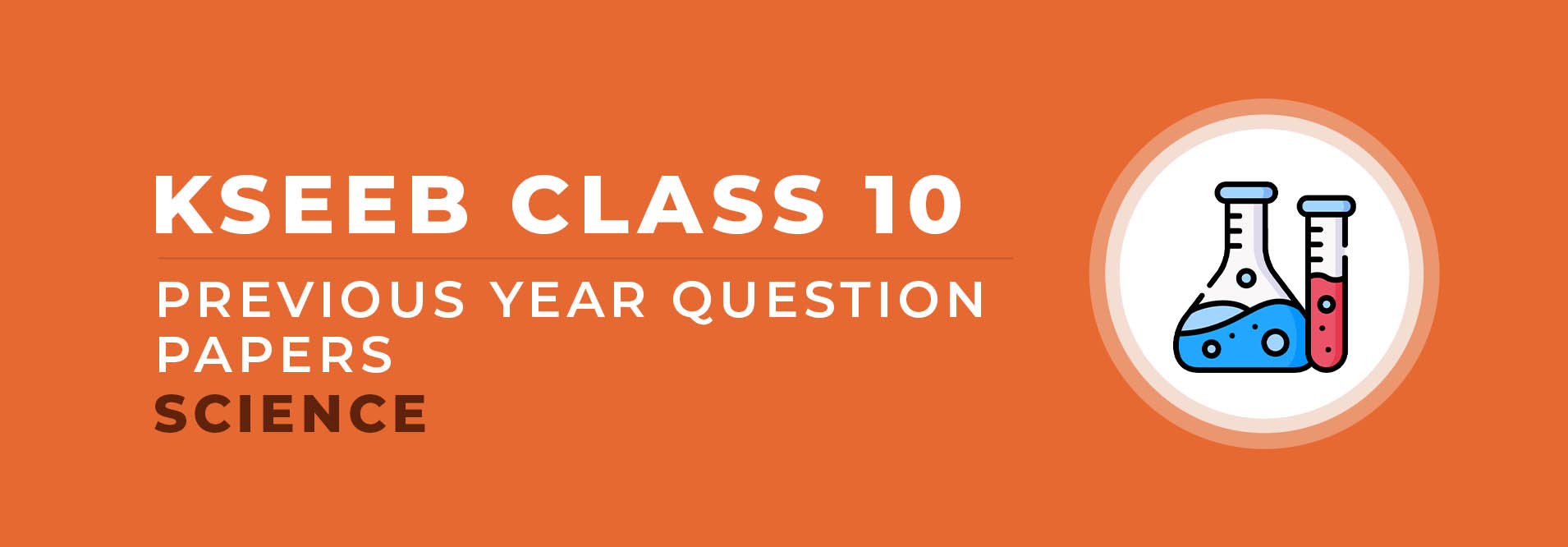KSEEB Science Previous Year Question Paper Class 10
Download the KSEEB Previous Years Papers for Class 10 Science. The best resource to prepare for your board exam. Science subject is all about practice. The more students practise, the more command they will get over the Science subject. So, here we have provided the KSEEB Previous Year Question Papers of Class 10 Science. Students should solve these papers before the board exams, so that they get an idea about the question paper pattern, marking scheme and difficulty level of exams.
KSEEB Class 10 Science Previous Year Question Papers 2020
KSEEB Class 10 Science Previous Year Question Papers 2019
KSEEB Class 10 Science Previous Year Question Papers 2018
KSEEB Class 10 Science Previous Year Question Papers 2017
Physics: Light– Reflection and Refraction, Human Eye and Colorful World, Electricity, Magnetic Effects of Electric Current, and Sources of Energy. Students learn the fundamental principles of reflection, refraction, electromagnetic induction, how electric current produces magnetism, and how electricity is produced from various forms of energy.
Chemistry: Chemical Reactions and Equations, Acids, Bases, and Salts, Metals and Non-Metals, Carbon Compounds, and Periodic Classification of Elements. Here, they learn about different types of chemical reactions, the reactivity of metals, physical and chemical properties of common carbon compounds, and how the elements in the periodic table are classified.
Biology: Life Processes, Control and Coordination in Animals and Plants, Reproduction, Heredity and Evolution, and Environmental studies. Here, students learn about respiration in plants and animals, nervous coordination, hormonal control, gametogenesis, basic principles of inheritance, and the environment. The KSEEB Class 10 Science syllabus prescribed by the Board is according to the NCERT curriculum which caters to the Education for All policy of Government of India. It aims at developing a deep understanding of basic principles and concepts of Science, as well as extensive training and rigorous practice.
The three streams of Science—Physics, Chemistry, and Biology—make up the KSEEB Class 10 Science syllabus. Science in KSEEB Class 10 is crucial because it lays the foundation for higher studies. Science has a vast syllabus and requires thorough understanding of concepts; it paves way for students to choose what they wish to pursue in future and also if they want to appear for competitive exams. Through Science, students are able to develop critical thinking and problem-solving skills, and also understand the natural world.
- Thorough Revision: One of the best ways to revise the complete syllabus of Science across Physics, Chemistry and Biology is to solve previous year question papers. Familiarity with
- Exam Pattern: Solving previous year question papers of science for class 10 will give an idea of the exam pattern such as the type of questions asked, their format as well as marking scheme making the students confident while they sit for the exam. Check Preparedness: Now that students have studied for the (CBSE) class 10 Science exam, it’s a good time to see how much they’ve learned and where they need to improve. Take an hour or so and solve as many as Science class 10 previous year question papers as you can. This will help you ascertain where you stand with your preparations. Time Management: Solving Science question papers for class 10 as one prepares for exams is a good way to enrich your time-management skills. It helps you know how much time you should give for the questions, problems and theorems. So use these question papers as a mirror and reflect how your preparations are. Answering the above question will help you figure out where you stand with your preparations.
- Realistic Exam Simulation: Solving science previous year question papers helps to simulate a real exam scenario. This is crucial in helping students familiarize themselves with the real exam environment, and eases their exam-related stress and anxiety.
| Topic | Key Concepts Covered | Typical Coverage in Past Papers |
| Physics | ||
| Mechanics | Motion, forces, laws of motion, equilibrium | Questions on Newton’s laws, equilibrium problems, and motion calculations |
| Electricity | Electric current, circuits, resistance, electrical energy | Problems involving Ohm’s Law, circuit analysis, and electrical power calculations |
| Magnetism | Magnetic fields, magnetic forces, electromagnetism, applications of magnets | Questions on magnetic fields, electromagnetic induction, and magnetic materials |
| Optics | Light, reflection, refraction, lenses, optical instruments | Problems on lens equations, mirror reflection, and optics principles |
| Energy Sources | Various sources of energy (thermal, solar, nuclear, renewable) | Questions on energy transformations, renewable energy technologies, and energy efficiency |
| Chemistry | ||
| Chemical Reactions | Types of chemical reactions, balancing equations, reaction kinetics | Balancing chemical equations, identifying reaction types, and rate law problems |
| Periodic Table | Elements, periodic trends, classification of elements based on properties | Questions on periodic trends, element properties, and periodic table organization |
| Acids and Bases | Properties of acids and bases, pH scale, neutralization reactions | Acid-base titration problems, pH calculations, and identifying acid-base properties |
| Metals and Non-metals | Properties, extraction methods, uses of metals and non-metals | Questions on metal reactivity, extraction processes, and metal alloys |
| Carbon Compounds | Organic chemistry, hydrocarbons, functional groups, organic reactions | Problems involving organic functional groups, naming organic compounds, and reaction mechanisms |
| Biology | ||
| Cell Structure | Cell organelles, cell membrane, nucleus, cytoplasm, cellular processes | Questions on cell anatomy, cellular transport mechanisms, and organelle functions |
| Genetics | Heredity, DNA, genes, genetic disorders, Mendelian genetics | Problems on Punnett squares, inheritance patterns, and genetic mutations |
| Reproduction | Sexual and asexual reproduction, human reproductive system, gametogenesis | Questions on reproductive anatomy, reproductive hormones, and reproductive cycles |
| Environment | Ecology, ecosystems, biodiversity, conservation, environmental issues | Problems on ecosystem dynamics, biodiversity loss, and environmental impact assessments |
| Ecosystems | Biotic and abiotic factors, food chains, food webs, ecological interactions | Questions on trophic levels, energy flow in ecosystems, and ecological succession |
| Period | Question Distribution | Difficulty Level | Repetitive Topics |
| 2012 – 2014 | Balanced distribution across various topics, slight emphasis on fundamental concepts | Varied difficulty, some years easier while others more challenging | Mechanics, electricity, chemical reactions |
| 2015 – 2017 | Shift towards application-based questions, deeper understanding required | Slightly increased difficulty, emphasis on problem-solving skills | Optics, organic chemistry |
| 2017 – 2020 | Emphasis on interdisciplinary topics, real-world applications observed | Relatively consistent difficulty, papers assess analytical and critical thinking abilities | Environmental science, modern physics |
| 2021 – 2022 | Increase in numerical-based questions, testing quantitative skills | Slight uptick in difficulty, focus on higher-order thinking and problem-solving | Biochemistry, genetics |
| 2023 | Balanced distribution across all subjects, comprehensive coverage of the syllabus | Moderate difficulty, mix of straightforward and challenging questions | Sustainable energy sources, ecosystem dynamics |
- Regular Practice: Schedule regular practice sessions to solve previous year papers under exam conditions. This will help you become familiar with the exam pattern, marking scheme etc., and the time taken in solving the paper will be much less than usual. It will also enhance your speed and accuracy, which are crucial for scoring well in exams. It will also induce a sense of preparedness and the fear of exams will be less.
- Identify Weak Points: After you solve a paper, don’t stop by just seeing the correct answer. Read all the solutions in detail and understand the concept behind it. Here, you will get to understand where you made a mistake and the conceptual understanding of the subject is reinforced, and the second time when you read the same thing, it is easier to remember.
- Effective Time Management: It is important to practice time management skills right now, so that when you actually sit for the exam, answering the entire paper within a time frame should not seem difficult. For this, you need to allocate time for each question, depending on its weightage and your understanding. Also, you need to read the entire question paper, see which are the ones you would want to solve in the first go, which are the easier ones and where to give more time. This practice will ensure that you don’t get clogged with basic questions and no time is left for the tougher ones.
- Revision for Exams: Use previous year papers to revise before the exams to reinforce your learning. Focus on the frequently asked topics and concepts in the previous papers. And once you finish that topic, go back again to the paper to see if you can get those questions correct now. Take the previous year papers as a tool to evaluate your preparation level and find out the areas that require you to revise more. Revision using previous papers will help you strengthen the level of understanding and confidence of the topics you have learned and ensure better performance in exams.
- Regular Practice: Allot separate time slots in your weekly schedule to solve KSEEB Science Question Papers. Regular practice will help you in getting familiar with the exam format and improve your time management skills. Analyze your mistakes in the paper and understand the concepts behind those mistakes to improve in that area.
- Topic-wise Practice: Divide your syllabus into small topics and practice them in an organized manner. Study one small topic and then revise it on the next day before starting with a new topic. Clear your doubts immediately. Understanding the topic by concept mapping, making flashcards, notes for quick revisions and summarizing the notes in your own words will help you memorize a subject for a long time. You can take help of your textbooks, online tutorials, and reference material for practicing the topics subject-wise.
- Mock Tests: This is the most important part of the study plan. Every 15 days, you should give a mock test to analyze your preparation level and understanding about the terms that you have learned. Also, make sure that you set a timer while giving the mock tests and solve them in a way that you are able to manage your time in the main exam. After taking the mock test, it is essential to meticulously evaluate your performance to identify both your strengths and weak areas. You can also gain valuable insights from teachers, peers, or mentors concerning ways to refine your exam strategy.
- Revision and Reinforcement: Learn by prioritizing revision and reinforcement so that concepts are consolidated and learning is reinforced. Play on these two processes of the mind by devising several techniques for revision recall, spaced recall and more. These methods would help to strengthen memory retention and improve recall of information. To test your understanding and depth of knowledge on the topics take previous year question papers. It will not only help to understand the layout of the paper but also you will find the frequently asked topics.
If you work through these strategies in a systematic way, not only will you be able to ace your KSEEB Class 10 Science exam but you will be able to maintain your composure and finish your paper within the allotted time.
KSEEB official website: The KSEEB official website provides an array of resources such as previous year question papers, sample papers, and study materials for KSEEB Class 10 Science.Check E-Learning Platforms: E-learning platforms provide a wide range of study material, video lectures, and practice tests suited specifically to KSEEB Class 10 Science. Many of these platforms incorporate gamification and other interactive experiences, which are designed to draw students in so they engage with content more attentively. As a general rule, more modern platforms will have features such as progress tracking, personalized recommendations, and doubt resolution support that ease the process of learning. This is absolutely essential as it frees students from the insecurities that often spring from the process of self study.
- Reference Books: If you identify the right book, it’s likely to offer an effective learning aid for KSEEB Class 10 Science. We have developed a comprehensive list of reference books for students so they can not only complete the syllabus in anticipation of your 10th board exam but also gain a greater depth of knowledge in the process. Given that reference books are authored by professionals who are experts in their field, they are more likely to contain correct information that is suitable for students. On that note, it’s crucial to obtain reference books that not only illuminate the more complex topics for students but also those that focus on both theoretical and numerical problems.
- Expert Tips and Best Practices: Scoring well in KSEEB Class 10 Science entails more than just understanding the concepts; it involves effective preparation and the right practice using expert tips and best practice methods. Here we present expert tips that will help you prepare and deal with this subject with ease:
| Sr. No. | Book Name | Author | Publisher |
| 1 | KSEEB Class 10 Science Part 1 | Various | KTBS (Karnataka Textbook Society) |
| 2 | KSEEB Class 10 Science Part 2 | Various | KTBS (Karnataka Textbook Society) |
| 3 | Oswaal Karnataka SSLC Question Bank Class 10 Science | Oswaal Editorial Board | Oswaal Books |
| 4 | All In One Science Class 10 Karnataka Board | Various | Arihant Publications |
| 5 | Together With Science Class 10 Karnataka Board | Various | Rachna Sagar |
| 6 | Exam Idea Science Class 10 Karnataka Board | Various | VK Global Publications |
| 7 | Mastering Science Class 10 Karnataka Board | Various | Mastermind Publications |
- Start Early and Plan Strategically: Start your preparation well in advance of the exam date so that you have enough time to cover all the topics properly. Create a realistic plan for your studies, where you allocate time for learning new concepts, for revision and for practice.
- Utilize Active Learning Techniques: Active Learning is a process where you learn something new and implement it then and there. For example if you are studying polarization then imagine what happens when a wave passes through a combination of two polaroids which are oriented at some angle.
- Practice Regularly with Previous Year Papers: Ready to solve at least last 10-12 years of previous year question papers from the date of the exam. If possible then solve them as a daily test. It will not only help you to understand the standard but also it will help you to familiarize yourself with exam patterns.
- Focus on Time Management: Time management is the key to score higher marks in NEET and practice is the key to manage time so well so that you could attempt all the questions and score as much as possible.
- Emphasize Quality Over Quantity: Number of hours if your study is not actually a criteria of your selection, but the quality of the study is. If you want to clear one of the toughest and one of the most competitive exams and want to choose a career which is most of the dream and just few make it true then you should go to the quality of the study. It is far better to understand and practice the solutions of 5 problems than to solve nearly 50 problems superficially. If you are solving problems of a particular topic then do not hesitate to solve it from different methods although the number of problems should not be large but sufficient for the understanding of the topic.
- Promptly Seek Clarification: If you doubt a specific concept or find a topic challenging, don’t procrastinate on getting your doubts or confusion clarified. Utilize online forums, teachers or form a study group to get your doubt cleared at the earliest.
- Regularly Review Your Mistakes: Make it a habit to thoroughly understand the mistakes made in practice papers or exercises. Going through and learning from the errors is one of the most effective ways to improve your scores.
- Remain Positive and Stress-Free: A positive outlook can act as a catalyst in pushing your scores to the 700 bracket. Regular breaks, physical activity, hobbies and a stress-free outlook will push your scores up. A relaxed mind is more receptive to newer concepts and understanding (and after all, this is the first step to memorizing!).
- Adapt and Personalize Your Study Techniques: Different people learn through different modes – be it visual learning through diagrams and video tutorials, or through auditory learning through discussions and lectures. It is important that you adapt and personalize the technique to the one that is best for you.
- Utilize Digital Resources: Opt for online resources and apps that offer interactive exercises, video tutorials etc. As the saying goes, “a picture speaks a thousand words” – animating a concept via a video will add much more to your memory than reading through the text of several pages long.
- Simulate the Exam Conditions: The only way to reduce the anxiety arising on the actual center-based testing is to acclimatize oneself to exam conditions. Hence, a regular practice of solving the papers in a quiet, exam-like environment will certainly make the day of your actual exam a tad easier to sail through.
- Stay Updated on Syllabus and Exam Guidelines: Stay informed about any syllabus changes and updates in exam guidelines by regularly checking the KSEEB’s official website.
By incorporating these expert tips and best practices into your preparation strategy, you’re laying a strong foundation for acing the KSEEB Class 10 exam. Always remember, consistency, perseverance, and a positive mind are key to facing challenges and achieving your academic goals.







Get Social